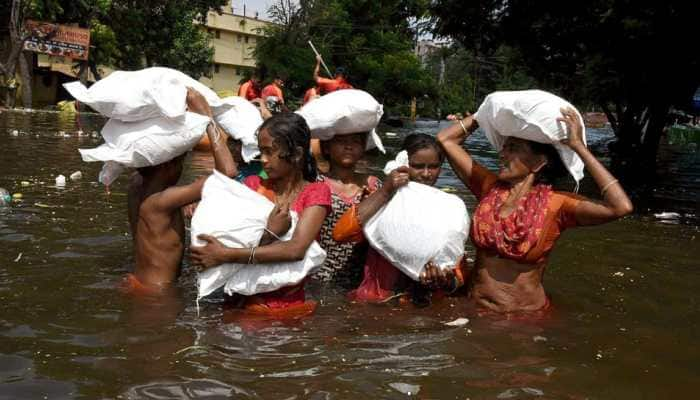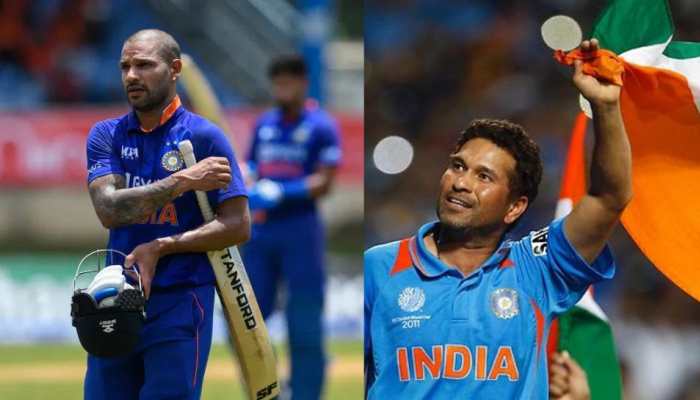Rahul Gandhi doing fear-mongering, playing with national security: Amit Shah on snooping row
Amit Shah's attack on Rahul Gandhi came after the latter called PM Modi an "insecure dictator".
Trending Photos
New Delhi: BJP national president Amit Shah on Friday hit back at Congress chief Rahul Gandhi over his criticism of the government order for monitoring of all computers, saying he was doing "fear-mongering" and playing with the national security.
BJP chief took to Twitter to slam the Congress chief for criticising the Home Ministry's order giving snooping powers to central agencies to seek computer data over suspicion.
"Yet again Rahul (Gandhi) does fear-mongering and plays politics with national security. UPA put no barriers on unlawful surveillance. When Modi government puts safeguards for citizens, Rahul cries conspiracy.
"Why are you lying so much and what is the fear that you are hiding," he said in a series of tweets.
Yet again Rahul does fear-mongering and plays politics with national security.
UPA put no barriers on unlawful surveillance. When Modi govt puts safeguards for citizens, Rahul cries conspiracy.
तुम इतना क्यों झुठला रहे हो, क्या डर है जिसको छुपा रहे हो! https://t.co/ulzGke4zIy— Amit Shah (@AmitShah) December 21, 2018
The Bharatiya Janata Party (BJP) chief also attacked the Congress saying that there were only "two insecure dictators" in the history of the country.
"There were only two insecure dictators in the history of India. One imposed emergency and the other wanted unrestricted access to read letters of common citizens.
"Guess who were they, Rahul Gandhi?" he said in an apparent reference to late prime ministers Indira Gandhi and Rajiv Gandhi.
There were only 2 insecure dictators in the history of India.
One imposed emergency and the other wanted unrestricted access to read letters of common citizens.
Guess who were they @RahulGandhi ? — Amit Shah (@AmitShah) December 21, 2018
Shah`s remarks came soon after Gandhi called Modi an "insecure dictator".
Earlier, the Congress chief said, "Converting India into a police state isn`t going to solve your problems, Modi Ji. It`s only going to prove to over 1 billion Indians what an insecure dictator you really are."
The BJP and Congress traded barbs after the Ministry of Home Affairs on Thursday issued an order giving 10 central agencies, including the CBI, the ED and the Delhi Police among others to "intercept, monitor and decrypt any information generated, transmitted, received or stored in any computer".
The Union Home Ministry also later issued a clarification, saying the notification "does not confer any new powers" and "every individual case will continue to require prior approval" of the Ministry and the state government.
The statement of the Ministry said that "adequate safeguards" were provided in the Information and Technology (IT) Act 2000 and similar provisions and procedures already existed in the Telegraph Act along with identical safeguards.
"The present notification is analogous to the authorisation issued under the Telegraph Act. The entire process is also subject to a robust review mechanism as in the case of Telegraph Act.
"Every individual case will continue to require prior approval of Home Ministry or state government. MHA has not delegated its powers to any law enforcement or security agency," said the statement.
Mentioning some points on the lawful interception or monitoring or decryption of information through computer resource, the Ministry cited Rule 4 of the IT (Procedure and Safeguards for Interception, Monitoring and Decryption of Information) Rules 2009.
It said the rule provides that the competent authority may authorise an agency of the government to intercept, monitor or decrypt information generated, transmitted, received or stored in any computer resource for the purpose specified in sub-section (1) of Section 69 of the 'Act'.
"The statutory order dated December 20 has been issued in accordance with rules framed in the year 2009 and in vogue since then. The notification has been issued to notify the ISPs (Internet Service Providers), TSPs and intermediaries to codify the existing orders.
"Each case of interception, monitoring, decryption is to be approved by the competent authority like Union Home Secretary," said the statement.
Stay informed on all the latest news, real-time breaking news updates, and follow all the important headlines in india news and world News on Zee News.
Live Tv







)
)
)
)
)
)
)
)
)
)
